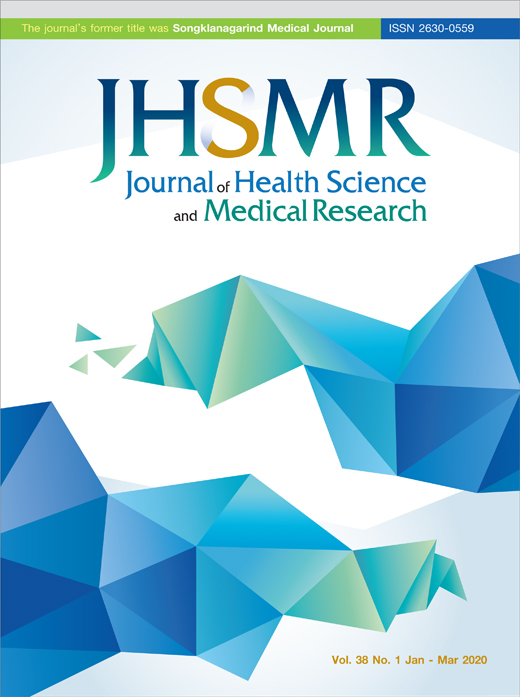Assessment of Type 2 Diabetes Patients’ Knowledge of Oral Hypoglycemic Agents
DOI:
https://doi.org/10.31584/jhsmr.202075Keywords:
oral hypoglycemic agents, patients’ knowledge, type 2 diabetes mellitusAbstract
Objective: Considering that adherence level affects diabetes treatment success and maintenance of glycemic control greatly, the aim of this study was to examine diabetes patients’ adherence to oral hypoglycemic agents (OHAs) and knowledge about their mechanism of action, dosing regimen, and side effects.
Material and Methods: This cross-sectional study was conducted on a sample of 100 patients with type 2 diabetes in order to assess their knowledge of OHAs using anonymous questionnaires.
Results: Most patients had used OHAs between 2 and 5 years (61.0%), where 78.0% were treated with metformin, and the remaining 22.0% were prescribed sulfonylurea derivatives. Besides drugs used for the treatment of type 2 diabetes, 58.0% of patients took another 1-3 drugs daily for the treatment of other conditions. Although 75.0% achieved a score of 5-6 out of the maximum score of 8, only 2.0% of respondents listed at least 2 side effects of the OHA they used, and none of them could explain its mechanism of action. Most of the information about OHAs was given to patients by endocrinologists (53.0%).
Conclusion: More than half of participants considered their knowledge of OHAs insufficient. Results clearly indicate that the respondents were not sufficiently familiar with the mechanism of action and possible side effects of such medications. Information about OHAs given in written form as well as via community pharmacists would contribute to educating type 2 diabetes patients significantly.
References
2. Zheng Y, Ley SH, Hu FB. Global aetiology and epidemiology of type 2 diabetes mellitus and its complications. Nat Rev Endocrinol 2018;14:88-98.
3. Brennan GM, Boyle DIR, McMahon AD, MacDonald TM, Jung RT, Newton RW, et al. Do patients with diabetes take their tablets? Diabetic Med 1998;15:S17.
4. Dunn CJ, Peters DH. Metformin. A review of its pharmacological properties and therapeutic use in non-insulin dependent diabetes mellitus. Drugs 1995;49:721-49.
5. Vermeire E, Van Royen P, Coenen S, Wens J, Denekens J. The adherence of type 2 diabetes patients to their therapeutic regimens: a qualitative study from the patient’s perspective. Practical Diabetes Int 2003;20:209-14.
6. Browne DL, Avery L, Turner BC, Kerr D, Cavan DA. What do patients with diabetes know about their tablets? Diabetic Med 2000;17:528-31.
7. Marks L. Counting the cost: the real impact of non-insulin dependent diabetes. London: British Diabetic Association;1996.
8. Sarkar U, Karter AJ, Liu JY, Adler NE, Nguyen R, López A, et al. The literacy divide: health literacy and the use of an internet based patient portal in an integrated health system-results from the diabetes study of northern California (DISTANCE). J Health Commun 2010;15:183–96.
9. Austin RP. Polypharmacy as a risk factor in the treatment of type 2 diabetes. Diabetes Spectr 2006;19:13–6.
10. Ibrahim IA, Kang E, Dansky KH. Polypharmacy and possible drug-drug interactions among diabetic patients receiving home health care services. Home Health Care Serv Q 2005;24:87–99.
11. Dunning T, Manias E. Medication knowledge and self-management by people with type 2 diabetes. Aust J Adv Nurs 2005;23:7–14.
12. Bailey CJ, Kodack M. Patients adherence to medication requirements for therapy of type 2 diabetes. Int J Clin Pract 2011;65:314-22.
13. Williams L, Caskey H, Coates V, Thompson K, Stewart H. A survey of patients’ knowledge on their diabetes medication. J Diabetes Nurs 2007;11:264-9.
14. Ojieabu WA, Arute JE, Ajayi TD. Assessment of medication knowledge among adults with diabetes mellitus in a Nigerian Teaching Hospital. Annals of Health Research 2015;1:62-7.
15. Gangwar SS, Ahmad A, Patel I, Parimalakrishnan S, Balkrishnan R, Singh SP. Assessment of medication knowledge and counseling in type 2 diabetes mellitus patients attending community pharmacy in rural north India. AJPSP 2013;4:47-57.
16. Norris SL, Lau J, Smith J, Schmid CH, Engelgau MM. Self Management education for adults with type 2 diabetes. Diabetes Care 2002;25:1159-71.
17. Thongsai S, Youjaiyen M. The long-term impact of education on diabetes for older people: a systematic review. Glob J Health Sci 2013;5:30–9.
18. Izquierdo RE, Knudson PE, Meyer S, Kearns J, Ploutz-Snyder R, Weinstock RS. A comparison of diabetes education administered through telemedicine versus in person. Diabetes Care 2003;26:1002-7.
























